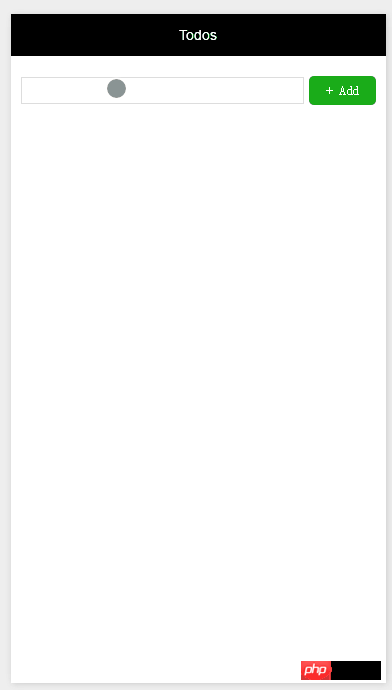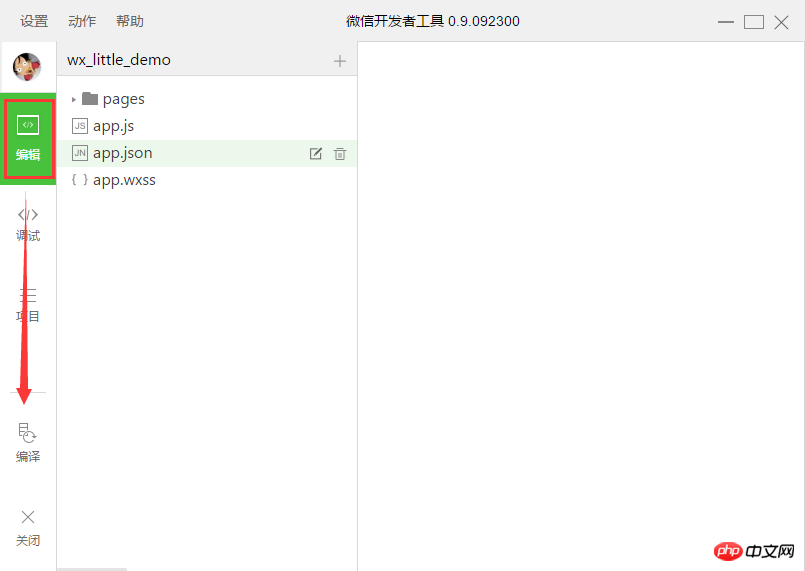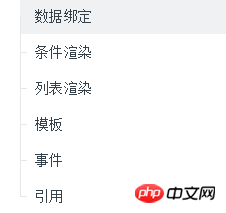Home >WeChat Applet >Mini Program Development >Detailed explanation of WeChat mini program framework and practical applications
Detailed explanation of WeChat mini program framework and practical applications
- 高洛峰Original
- 2017-03-10 16:18:102067browse
This article mainly explains the detailed explanation of the WeChat Mini Program framework and relevant information on example applications. Friends in need can refer to
to quickly understand the use of WeChat Mini Programs, a framework development based on the Mini Programs todos app
WeChat official has opened the official documentation and developer tools of the WeChat applet. In the past two days, I have been reading relevant news to understand how to develop small programs. After the official documents came out in the past two days, I quickly glanced at them and focused on the two parts of the document: framework and components, and then based on Simple tutorial to make a regular todo app. This app is based on the WeChat applet platform and implements the regular functions of the todo app. At the same time, in order to make it closer to the actual work scenario, it also uses the loading and toast components to complete the interaction and feedback of some operations. My intuitive feeling about this platform is that, at a technical level, it is similar to Vue, but it is far less powerful than Vue; the development ideas are not like Vue, but more like backbone. Therefore, people who have used mvc, mvvm frameworks such as backbone and vue will find it easy to get started with this platform. This article mainly introduces some key points of the implementation of this todo app.
First add the information related to this article:
Official documentation: https://mp.weixin.qq.com/debug/wxadoc/dev/index.html
Official developer tool download: https://mp.weixin.qq.com/debug/wxadoc/dev/devtools/download.html
Function demonstration of todo app in this article:

Note: You need to long press the todo text to edit it directly. Because it is on the mobile phone, you cannot use the double-click event for editing, and changed it to the long-press event. The mini program platform also does not provide binding for double-click events.
If you want to run this project locally, you need to install the developer tools first. Follow the simple tutorial in the document to build a project first;
After the construction is completed, the developer tools will open this Project;
Then find the folder of the built project on the disk, delete all the contents inside, and paste all the files in the source code folder above;
Then reopen the developer tools, first Enter the edit tab, and then click the compile button, you will directly enter the debugging interface to view the functions of the app:

The following is an introduction to the key points of developing this app:
1. The directory structure and configuration of this app will not be introduced in detail. These are described in detail in the Document-Framework section. There is no html and css in this platform, replaced by wxml and wxss. There is almost no difference between wxss and css. The disadvantage is that it is not as powerful as css and supports limited selectors. But the advantage is that since there is only one platform, WeChat, there are almost no compatibility issues and you can use standard and updated CSS technology. Only the tags of those components provided by the platform can be used in wxml. HTML tags cannot be used directly. Examples of how to use each component in wxml can be found in the Document - Components section. So in fact, there is no problem in writing wxml and wxss.
2. wxml supports the following features:

In the todo app, except templates and references, all others are used, but The details of each feature are not used, only the appropriate functions are selected according to the needs of the app. I saw an article a few days ago saying that the WeChat applet may be implemented based on the vue framework, so I took a look at the vue documentation. For data binding, conditional rendering, list rendering, and events, we have looked at the usage of vue in detail. In comparison, the features provided by wxml are quite similar to the related features of vue, but there are not so many functions, so it is not easy to directly use the features of the vue framework into small programs. The best practice is still based on the instructions provided in the official documents. If the functions are not mentioned in the official documents, it will definitely not work if you use them by guessing. I checked the prototypes of some objects by printing, and I did not find more instance methods than in the official documents, which shows that the framework function of the mini program is indeed limited.
3. Wxss can actually be written in less or sass, as long as the selector meets the requirements of the framework. Due to time constraints, I didn’t try it in this app.
4. There is no two-way binding. In Vue, a Vue instance is a view-model; updates to data in the view layer will be fed back to the model in real time; updates to the model will also be fed back to the view in real time. In the mini program, there is no two-way binding, and the update of the view will not be directly synchronized to the model; you need to get the data directly from the view layer in the relevant event callback, and then update the model through setData. The mini program will use setData inside the mini program. Then re-render the page. For example, for a single todo item, the toggle operation is:
toggleTodo: function( e ) {
var id = this.getTodoId( e, 'todo-item-chk-' );
var value = e.detail.value[ 0 ];
var complete = !!value;
var todo = this.getTodo( id );
todo.complete = complete;
this.updateData( true );
this.updateStorage();
},
In the above code, the value of the checkbox in a single todo item is obtained through e.detail.value[0] , use this value to determine the complete status of todo. Finally, inside updateData, the content of the model will be refreshed through the setData method. Only in this way will the statistics at the bottom of the app be updated after the toggle operation.
5. When event binding, parameters cannot be passed, only one event can be passed. For example, in the toggle operation above, I actually wanted to pass the current todo's ID to the callback, but I couldn't do it in every possible way. In the end, I could only handle it through the ID method: binding it in wxml. On the component of the event, add an id. This id cannot be repeated in the entire page, so the id must be prefixed, and then add the todo id value at the end of the id; when the event is triggered, it can be obtained through e.currentTarget.id For the component's id, remove the corresponding id prefix to get the todo's id value. This is a method currently used. I think it is not very elegant. I hope to find a better way to implement it later.

#6. The loading effect is taken into consideration in the app and must be achieved by using the loading attribute of the button component. But loading is just a style control, it does not control whether the button can be clicked repeatedly. Therefore, we must also use the disabled attribute of button to prevent repeated clicks.
The remaining implementation details are in the source code of the following two files. You are welcome to point out the problems.
Source code of index.wxml:
<!--list.wxml-->
<view class="container">
<view class="app-hd">
<view class="fx1">
<input class="new-todo-input" value="{{newTodoText}}" auto-focus bindinput="newTodoTextInput"/>
</view>
<button type="primary" size="mini" bindtap="addOne" loading="{{addOneLoading}}" disabled="{{addOneLoading}}">
+ Add
</button>
</view>
<view class="todos-list" >
<view class="todo-item {{index == 0 ? '' : 'todo-item-not-first'}} {{todo.complete ? 'todo-item-complete' : ''}}" wx:for="{{todos}}" wx:for-item="todo">
<view wx-if="{{!todo.editing}}">
<checkbox-group id="todo-item-chk-{{todo.id}}" bindchange="toggleTodo">
<label class="checkbox">
<checkbox value="1" checked="{{todo.complete}}"/>
</label>
</checkbox-group>
</view>
<view id="todo-item-txt-{{todo.id}}" class="todo-text" wx-if="{{!todo.editing}}" bindlongtap="startEdit">
<text>{{todo.text}}</text>
</view>
<view wx-if="{{!todo.editing}}">
<button id="btn-del-item-{{todo.id}}" bindtap="clearSingle" type="warn" size="mini" loading="{{todo.loading}}" disabled="{{todo.loading}}">
Clear
</button>
</view>
<input id="todo-item-edit-{{todo.id}}" class="todo-text-input" value="{{todo.text}}" auto-focus bindblur="endEditTodo" wx-if="{{todo.editing}}"/>
</view>
</view>
<view class="app-ft" wx:if="{{todos.length > 0}}">
<view class="fx1">
<checkbox-group bindchange="toggleAll">
<label class="checkbox">
<checkbox value="1" checked="{{todosOfUncomplted.length == 0}}"/>
</label>
</checkbox-group>
<text>{{todosOfUncomplted.length}} left.</text>
</view>
<view wx:if="{{todosOfComplted.length > 0}}">
<button type="warn" size="mini" bindtap="clearAll" loading="{{clearAllLoading}}" disabled="{{clearAllLoading}}">
Clear {{todosOfComplted.length}} of done.
</button>
</view>
</view>
<loading hidden="{{loadingHidden}}" bindchange="loadingChange">
{{loadingText}}
</loading>
<toast hidden="{{toastHidden}}" bindchange="toastChange">
{{toastText}}
</toast>
</view>
Source code of index.js:
var app = getApp();
Page( {
data: {
todos: [],
todosOfUncomplted: [],
todosOfComplted: [],
newTodoText: '',
addOneLoading: false,
loadingHidden: true,
loadingText: '',
toastHidden: true,
toastText: '',
clearAllLoading: false
},
updateData: function( resetTodos ) {
var data = {};
if( resetTodos ) {
data.todos = this.data.todos;
}
data.todosOfUncomplted = this.data.todos.filter( function( t ) {
return !t.complete;
});
data.todosOfComplted = this.data.todos.filter( function( t ) {
return t.complete;
});
this.setData( data );
},
updateStorage: function() {
var storage = [];
this.data.todos.forEach( function( t ) {
storage.push( {
id: t.id,
text: t.text,
complete: t.complete
})
});
wx.setStorageSync( 'todos', storage );
},
onLoad: function() {
this.setData( {
todos: wx.getStorageSync( 'todos' ) || []
});
this.updateData( false );
},
getTodo: function( id ) {
return this.data.todos.filter( function( t ) {
return id == t.id;
})[ 0 ];
},
getTodoId: function( e, prefix ) {
return e.currentTarget.id.substring( prefix.length );
},
toggleTodo: function( e ) {
var id = this.getTodoId( e, 'todo-item-chk-' );
var value = e.detail.value[ 0 ];
var complete = !!value;
var todo = this.getTodo( id );
todo.complete = complete;
this.updateData( true );
this.updateStorage();
},
toggleAll: function( e ) {
var value = e.detail.value[ 0 ];
var complete = !!value;
this.data.todos.forEach( function( t ) {
t.complete = complete;
});
this.updateData( true );
this.updateStorage();
},
clearTodo: function( id ) {
var targetIndex;
this.data.todos.forEach( function( t, i ) {
if( targetIndex !== undefined ) return;
if( t.id == id ) {
targetIndex = i;
}
});
this.data.todos.splice( targetIndex, 1 );
},
clearSingle: function( e ) {
var id = this.getTodoId( e, 'btn-del-item-' );
var todo = this.getTodo( id );
todo.loading = true;
this.updateData( true );
var that = this;
setTimeout( function() {
that.clearTodo( id );
that.updateData( true );
that.updateStorage();
}, 500 );
},
clearAll: function() {
this.setData( {
clearAllLoading: true
});
var that = this;
setTimeout( function() {
that.data.todosOfComplted.forEach( function( t ) {
that.clearTodo( t.id );
});
that.setData( {
clearAllLoading: false
});
that.updateData( true );
that.updateStorage();
that.setData( {
toastHidden: false,
toastText: 'Success'
});
}, 500 );
},
startEdit: function( e ) {
var id = this.getTodoId( e, 'todo-item-txt-' );
var todo = this.getTodo( id );
todo.editing = true;
this.updateData( true );
this.updateStorage();
},
newTodoTextInput: function( e ) {
this.setData( {
newTodoText: e.detail.value
});
},
endEditTodo: function( e ) {
var id = this.getTodoId( e, 'todo-item-edit-' );
var todo = this.getTodo( id );
todo.editing = false;
todo.text = e.detail.value;
this.updateData( true );
this.updateStorage();
},
addOne: function( e ) {
if( !this.data.newTodoText ) return;
this.setData( {
addOneLoading: true
});
//open loading
this.setData( {
loadingHidden: false,
loadingText: 'Waiting...'
});
var that = this;
setTimeout( function() {
//close loading and toggle button loading status
that.setData( {
loadingHidden: true,
addOneLoading: false,
loadingText: ''
});
that.data.todos.push( {
id: app.getId(),
text: that.data.newTodoText,
compelte: false
});
that.setData( {
newTodoText: ''
});
that.updateData( true );
that.updateStorage();
}, 500 );
},
loadingChange: function() {
this.setData( {
loadingHidden: true,
loadingText: ''
});
},
toastChange: function() {
this.setData( {
toastHidden: true,
toastText: ''
});
}
});
Finally, I need to add that this app was developed based on WeChat’s official documents within a limited time, so I don’t know whether the implementation method here is reasonable. I only use this app to understand the usage of the mini program platform. I hope WeChat officials can launch some more comprehensive, preferably project-based demos to provide us developers with a best practice specification at the code level. Friends who have other development ideas are welcome to help me point out the problems in my above implementation.
Through this article, I hope everyone will understand the framework of WeChat mini programs. Thank you for your support of this site!
The above is the detailed content of Detailed explanation of WeChat mini program framework and practical applications. For more information, please follow other related articles on the PHP Chinese website!
Related articles
See more- WeChat Mini Program Simple DEMO layout, logic, and style exercises
- Detailed explanation and examples of WeChat applet wx.request (interface calling method)
- WeChat Mini Program - Detailed explanation of WeChat login, WeChat payment, and template messages
- WeChat applet (application account) simple example application and detailed explanation of the example
- Detailed explanation of WeChat applet for loop

